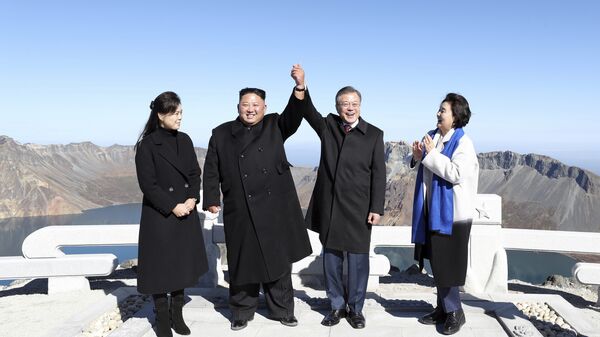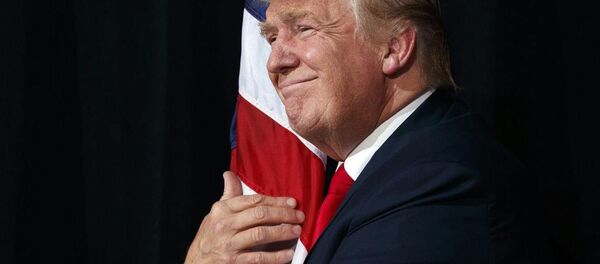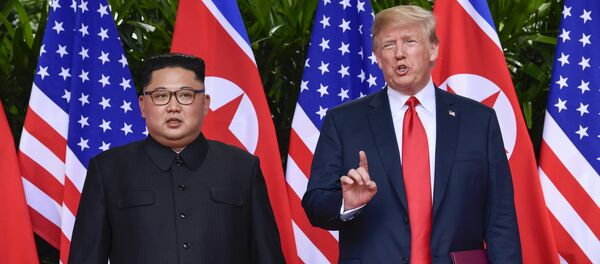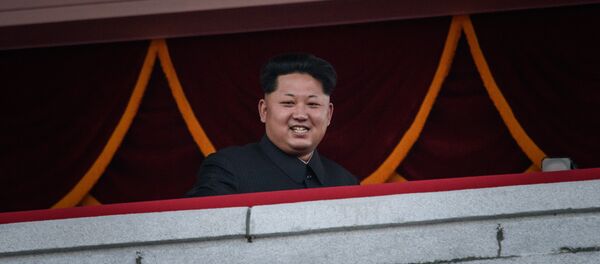During his address, Kim said that while he was willing to meet with US President Donald Trump, he would also explore a "new way" to develop the country if the US maintains economic sanctions against Pyongyang. For his part, Trump said in a tweet that he also looks forward "to meeting with Chairman Kim who realizes so well that North Korea possesses great economic potential!"
Hyun Lee, a member of the Solidarity Committee for Democracy and Peace in Korea, joined Loud & Clear on Radio Sputnik to discuss the latest developments.
"The most striking thing is that the US media is focusing exclusively on what Kim Jong Un said about the nuclear talks with the US. But when you look at the actual speech, that part was just maybe one to two paragraphs of the entire speech. The majority of the speech was about building a self-reliant economy and continuing to improve North-South relations. He, Kim Jong Un, proposed two slogans to the people of North Korea, which is like the banner that will guide the entire society this year. One of them was, ‘Let us open a new road of advance for socialist construction under the uplifted banner of self-reliance.' The second one was, ‘Let us usher in a heyday of peace, prosperity and reunification of the Korean Peninsula by thoroughly implementing the historic North-South declarations,'" said Lee.
"It's clear from Kim Jong Un's speech that the economy and Korean relations will be priorities for North Korea this year," Lee noted.
Meanwhile, US-centric publication the New York Times published a news analysis with the headline, "Kim and Trump Back at Square 1: If the US Keeps Sanctions, North Korea Will Keep Nuclear Program." The "essential message" of Kim's address was that "Trump finds himself essentially back where he was at the beginning in achieving the ambitious goal of getting Mr Kim to relinquish his nuclear arsenal," the New York Times declared.
But North Korean policy doesn't revolve around how Washington will respond, according to Lee. To better understand the thinking of Kim and North Korea, look to historical patterns, she said.
"Just a little historical background: former leader Kim Jong Il was facing a world where the Soviet Union had collapsed. There was no more socialist trading block. The country was facing an economic crisis, especially in light of intensified US sanctions as well. And so, at that time, North Korea felt that building up its defence was the number one priority. For North Korea, when they said ‘military first,' it was building up national defence as a priority, but it also meant that the army played a very significant role in the construction of its economy. So it was the military in North Korea that rebuilt factories, built the dams, irrigated canals for agriculture. So ‘military first' has a deeper meaning than just ‘defence first,'" said Lee.
"And then we come to last year's New Year speech by the new leader, Kim Jong Un. North Korea was feeling confident that it had completed some very successful nuclear and missile test launches. They determined their nuclear weapons program was successful enough as a deterrent for their country against mainly US nuclear threats. Having completed their nuclear weapons program, North Korea felt they were confident to shift their national focus to building their economy," Lee told Sputnik.
"This is something not necessarily new. Since the economic crisis of the mid-1990s to early 2000s, they have been pursuing what's called the ‘byungjin' line, which is two parallel tracts: [one] pursuing its nuclear weapons program for deterrence, and then also [one] pursuing a self-reliant economic development model. Now, I think they're signalling that they're ready to go full speed ahead in focusing on their economy," said Lee.





